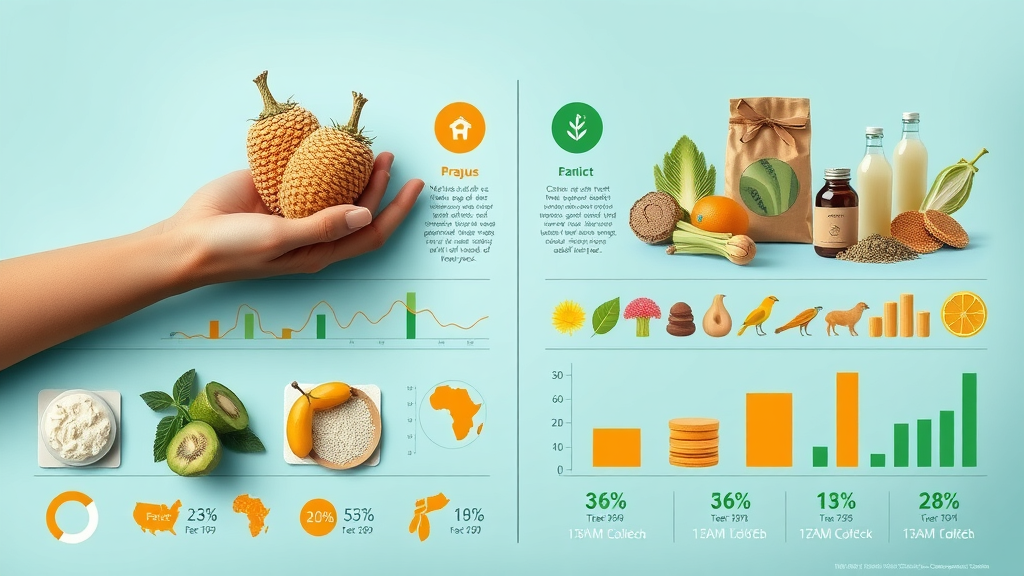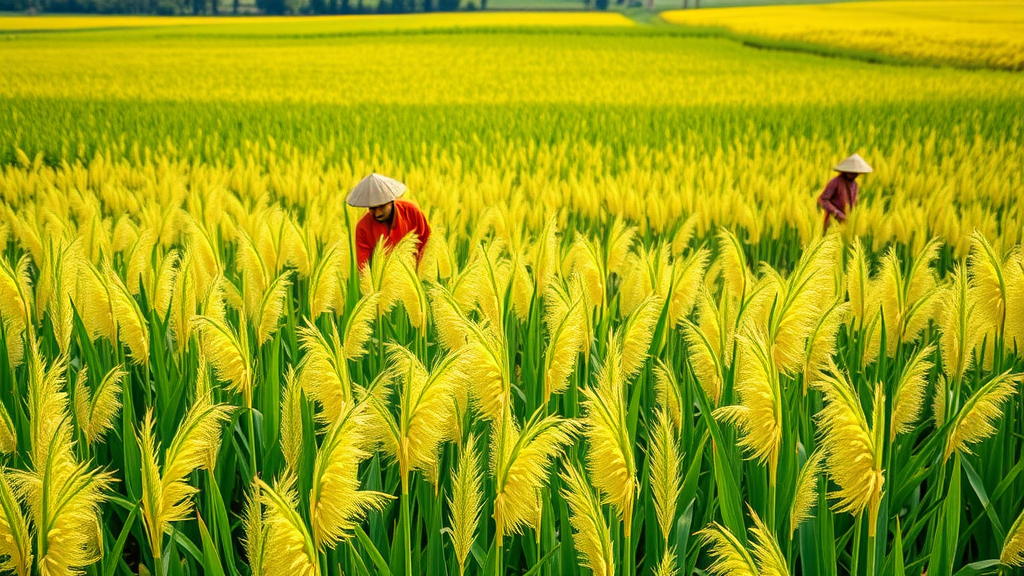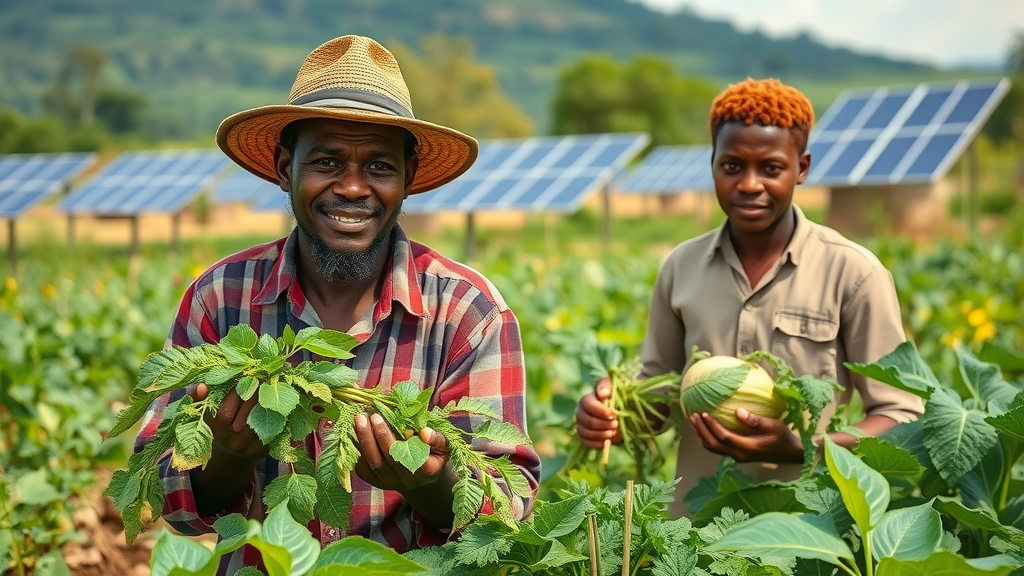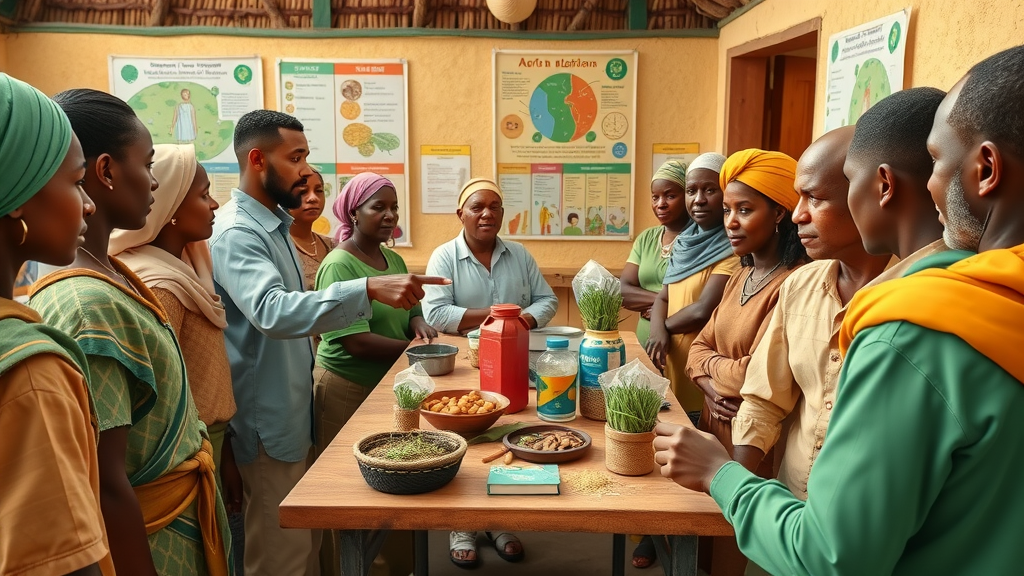Did you know a litre of lemongrass essential oil can earn thousands of times more than a kilogram of raw grass? This staggering fact signals an untapped goldmine within value addition in African agriculture . Beyond traditional farming lies a transformative journey—turning raw crops into profitable, sustainable products that empower farmers and communities alike. Join us as we explore how this vital process elevates African agriculture, spotlight real-world success from Utulivu Naturals Uganda, and share actionable guidance to catalyze growth across the continent.
What You'll Learn
- Key insights about the economic value of agricultural value chains in Africa.
- A clear understanding of what value addition in African agriculture entails and how it transforms raw products.
- How lemongrass essential oil exemplifies lucrative value addition opportunities.
- The role of private sector and sustainable practices in fostering climate resilience and food security.
- Common misconceptions and major opportunities in agricultural value chains.
- Practical steps and strategies for farmers to implement value addition successfully.
Startling Facts About Value Addition in African Agriculture
The Economic Impact of Agricultural Value Chains in Africa
Agriculture remains the backbone of many African economies, but much of the continent’s potential is throttled by reliance on selling raw produce. Value addition in African agriculture changes this dynamic dramatically. By processing crops into higher-value goods, farmers and entrepreneurs unlock substantially higher profits and create lasting economic impact.
Brenda Migwalla, of Utulivu Naturals Uganda, explains, "A litre of lemongrass essential oil earns thousands of times more than a kilogram of raw grass, demonstrating the immense potential of value addition in African agriculture."
This comparison illustrates why shifting focus to value-added products could transform livelihoods and economies across Africa.

Understanding Value Addition in African Agriculture
Defining Agricultural Value Chain and Chain Development
The agricultural value chain encompasses all activities from crop cultivation through harvesting, processing, packaging, and marketing. Value addition in African agriculture specifically refers to the processes that increase a product's market value by enhancing its quality, utility, or appeal. Chain development means improving each link—strengthening farmer capabilities, processing techniques, and distribution networks—to maximize benefits across stakeholders.
When done effectively, these value chains reduce losses, improve incomes, and foster sustainable rural development. They stimulate job creation and promote diversification, making agriculture more resilient to market fluctuations and climate pressures.
How Value Addition Transforms Raw Produce into Profitable Products
Raw agricultural produce has limited shelf life and low market prices. However, through processes such as drying, milling, extraction, or packaging, farmers convert these into value-added products commanding premium prices. For example, turning lemongrass into essential oil through steam distillation magnifies its profitability manifold, creating versatile products for cosmetics, wellness, and industrial sectors.
This transformation not only benefits producers with higher margins but also supplies consumers with improved, sustainable goods. Ultimately, value addition in African agriculture paves the way for more competitive, innovative agribusinesses across the continent.
The Role of Value Addition in Enhancing Agriculture in Africa
From Raw Crops to Essential Oils: A Case Study of Lemongrass
Utulivu Naturals Uganda’s journey with lemongrass exemplifies how targeted value addition can unlock immense value. Starting with an undervalued raw crop often overlooked as simple tea herb, Utulivu used steam distillation to extract essential oils. These oils have widespread applications in healing, skincare, and household wellness products.
As Brenda Migwalla reflects, "We’ve replaced chemicals in households, made wellness more affordable, and most importantly—we’ve created real revenue."
This success story symbolizes the broader opportunity that value addition in African agriculture presents to farmers willing to innovate and invest in processing and branding.

Private Sector Involvement in Agricultural Value Chains
The involvement of private enterprises plays a pivotal role in unlocking value addition opportunities. Investment in processing infrastructure, product development expertise, and market access accelerates growth and sustainability. Collaboration between entrepreneurs, farmers, and agricultural experts creates vibrant value chains offering better returns and fostering innovation.
At Utulivu Naturals, diverse African business leaders work closely with farmers to develop natural products that meet international standards. These partnerships ensure that value addition is not just an isolated activity, but a comprehensive ecosystem that sustains communities and economies.

Sustainable Development and Climate Change: Value Addition as a Solution
How Sustainable Practices in Value Addition Support Climate Resilience
Sustainability is integral to value addition in African agriculture . By adopting eco-friendly farming and processing methods—such as organic cultivation, renewable energy use, and efficient resource management—value chains contribute to climate resilience. These practices reduce environmental impact, conserve biodiversity, and promote long-term productivity.
Utulivu Naturals champions these ideals by sourcing ingredients responsibly and integrating solar-powered production methods. This approach not only protects ecosystems but also enhances product value by meeting growing global demand for sustainable goods.
The Impact of Value Addition on Food Security in Africa
Value addition also strengthens food security by reducing post-harvest losses and improving product availability. Processed foods can be stored longer, transported safely, and marketed widely, ensuring that communities have access to nutritious products year-round.
Moreover, the income generated from value-added products empowers farmers to invest in better inputs and technologies, further boosting agricultural productivity and resilience. Thus, value addition in African agriculture directly supports Africa’s fight against hunger and malnutrition.

Challenges and Opportunities in Agricultural Value Chains
Common Misconceptions About Value Addition in African Agriculture
Despite its promise, value addition in African agriculture faces misconceptions that hinder adoption. Many farmers view it as capital-intensive, complex, or risky, while others underestimate the market demand for processed products. These myths discourage investment in processing and limit growth.
However, as Brenda Migwalla emphasizes, "If you only plan to sell raw produce, be ready for small margins, slow returns, and heartbreak. Value addition is Africa’s biggest opportunity in agriculture."
Education and success stories can shift mindsets, demonstrating that value addition is achievable and highly rewarding.

Opportunities for Farmers: Beyond Selling Raw Produce
Value addition opens many doors for African farmers beyond traditional crop sales. It allows them to diversify income streams by producing oils, extracts, packaged foods, and wellness products. This diversification mitigates risks associated with market fluctuations and climate shocks.
Additionally, value addition encourages skills development in processing, quality control, marketing, and entrepreneurship. Such capabilities empower farmers to compete globally and capture greater shares of agricultural value generated in Africa.
Actionable Tips for Implementing Value Addition in African Agriculture
Steps to Start Value Addition on Your Farm
- Assess Market Demand: Identify high-value products with strong local or export demand.
- Choose Suitable Crops: Select crops like lemongrass with proven value addition potential.
- Invest in Processing Skills: Learn techniques such as distillation, drying, or packaging.
- Develop Quality Standards: Maintain consistent, attractive product quality to build trust and brand.
- Collaborate and Network: Engage with agribusiness experts, local cooperatives, and markets.
Training and Community Engagement for Sustainable Growth
Scaling value addition requires ongoing training and community involvement. Sharing knowledge about processing methods, sustainable farming, and business management builds capacity across farming networks. Utulivu Naturals hosts educational workshops that empower farmers with tools and information to succeed.
Community engagement also fosters collaborative problem-solving and resource sharing, key ingredients for sustainable growth. Together, farmers become innovators, advocates, and entrepreneurs driving Africa’s agricultural transformation.
| Aspect | Raw Produce | Value-Added Products |
|---|---|---|
| Profit Margins | Low margins due to commodity pricing and perishability. | High margins driven by product differentiation and branding. |
| Market Demand | Limited to local or bulk buyers; price sensitive. | Diverse markets include retail, cosmetics, wellness, and exports. |
| Sustainability | Higher post-harvest losses; limited environmental control. | Improved resource efficiency; supports eco-friendly practices. |
| Income Stability | Variable, affected by price fluctuations and climate risks. | More consistent and diversified revenue streams. |
| Employment Opportunities | Mostly farm labor focused. | Creates jobs in processing, packaging, marketing, and logistics. |

People Also Ask: Common Questions on Value Addition in African Agriculture
What is an example of value addition in agriculture?
A classic example is the processing of lemongrass into essential oil. While raw lemongrass has limited value, its distilled essential oil is highly sought after in cosmetics and wellness industries, vastly increasing its profitability.
What is the future of agriculture in Africa?
The future hinges on innovation like value addition in African agriculture , embracing sustainability, technology, and private sector partnerships to boost productivity, profitability, and resilience against climate challenges.
What are the value addition opportunities in agriculture in Uganda?
Uganda’s rich crop diversity allows value addition into oils, dried foods, packaged herbs, and processed staples. Utulivu Naturals has showcased how lemongrass essential oil production can revolutionize local agribusinesses.
Why is value adding important in agriculture?
Value addition increases income for farmers, creates jobs, reduces wastage, enhances food security, and fosters sustainable rural development, key to Africa’s agricultural growth.
Key Takeaways: Unlocking the Potential of Value Addition in African Agriculture
- Value addition turns low-value raw crops into lucrative products, drastically raising farmer incomes.
- It supports sustainable farming practices that promote climate resilience and food security.
- Private sector engagement and community training are critical to scaling value chains.
- Common misconceptions deter many, but education and success stories reveal the vast opportunities.
- Farmers and entrepreneurs can implement value addition with strategic planning, skill development, and collaboration.
Conclusion: Transforming African Agriculture One Product at a Time
Brenda Migwalla, of Utulivu Naturals Uganda, concludes with a vision: "Let’s transform agriculture. One farm. One plant. One product at a time."
This mindset encourages African farmers and agripreneurs to embrace value addition as the cornerstone for profitability, sustainability, and empowerment.
Ultimately, unlocking value addition in African agriculture offers a pathway not just to economic success, but to a greener, healthier, and more resilient continent.
Discover Utulivu Naturals Located In Uganda
- Explore our range of natural, sustainable products made from lemongrass essential oil.
- Learn how value addition can revolutionize your farming business.
- Join our community to empower sustainable agriculture in Africa.
Learn More at Utulivu Naturals
- Visit https://www.unaturals.shop/ for detailed product information and community initiatives.
Value addition in African agriculture is a transformative strategy that enhances the economic value of raw agricultural products through processing, packaging, and marketing. This approach not only increases farmers’ incomes but also stimulates job creation and promotes sustainable development across the continent.
A notable example is the Cassava Adding Value for Africa (C:AVA) project, which has significantly improved the livelihoods of smallholder farmers in Ghana, Malawi, Nigeria, Tanzania, and Uganda. By introducing higher-yielding, disease-tolerant cassava varieties and promoting processing into products like high-quality cassava flour and grits, the project has led to yield increases ranging from 16% in Ghana to over 100% in Uganda. This initiative has generated over USD 57 million in income for rural communities, demonstrating the substantial benefits of value addition. ( ajol.info )
In Kenya, a value-addition project focusing on traditional food crops has developed innovative products such as sorghum popcorn, finger millet cakes, and pigeon pea samosas. These nutritious, gluten-free foods cater to evolving consumer needs and have created economic opportunities for youth in rural areas. By enhancing the marketability of drought-tolerant crops, the project contributes to food security and economic empowerment. ( allafrica.com )
Furthermore, the African Development Bank is mobilizing $2.2 billion to establish agricultural processing zones in 28 Nigerian states. These zones aim to bring processing facilities closer to farmers, reducing post-harvest losses and strengthening agricultural value chains. This initiative is expected to enhance food security and generate employment, illustrating the critical role of value addition in transforming Africa’s agricultural sector. ( reuters.com )
By embracing value addition, African farmers and entrepreneurs can unlock new markets, increase profitability, and drive sustainable economic growth. If you’re serious about enhancing agricultural productivity and sustainability, these resources provide valuable insights and strategies to guide your efforts.
 Add Row
Add Row  Add
Add 



Write A Comment